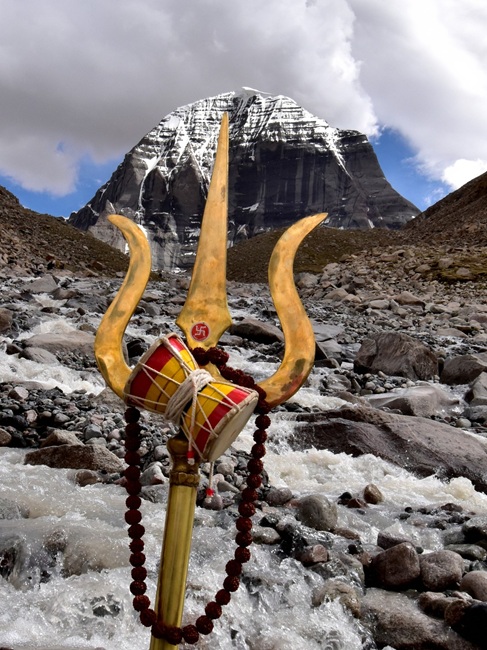Mar 05, 2026
Mar 05, 2026
How India ‘Gave Away’ The ‘Throne of Shiva’ Without A Fight
What do we call it when a nation forgets its gods? When it forgets its own? When the path to its holiest mountain becomes a foreign policy formality stamped by another flag?
Why is Mount Kailash, the spiritual epicenter of over a billion Hindus, Buddhists, Jains, and Bon followers, not in India? Why must Indian pilgrims beg Beijing for permission to kneel before Mahadev? Why did we silently let go of what generations once walked barefoot to embrace?
These are not rhetorical questions. They are national wounds disguised as diplomatic footnotes.

The Mountain Beyond Borders
Mount Kailash is not just a geological formation. It is the symbolic axis of the universe in Hindu cosmology. It is where Lord Shiva resides in eternal meditation. In Jainism, it is Ashtapada, the site where Rishabhdev attained nirvana. In Tibetan Buddhism, it is Kang Rinpoche, the precious snow jewel. To Bon practitioners, it is Sipai Me, the sacred nine-story mountain.
And yet, this sacred site now lies fenced behind layers of bureaucracy in the Tibet Autonomous Region of the People's Republic of China.
How Did We Lose Kailash?
The answer begins not with war, but with silence.
In 1913, Tibet declared independence from Qing China and entered into diplomatic negotiations with British India. The Simla Convention of 1914, though never recognized by China, was signed by both British India and Tibet. This established Tibet as a buffer state, a sovereign entity in the Himalayas with its own flag, currency, script, and administrative governance.
Post-1947, the Government of India inherited not only these diplomatic legacies but also the moral responsibility to protect one of its civilizational arteries. Instead, in 1950, when the People’s Liberation Army of China invaded Tibet, New Delhi chose diplomatic restraint over resistance.
By 1954, India had signed the now-infamous Panchsheel Agreement. One of the first countries to officially recognize Chinese sovereignty over Tibet, India sealed the fate of Mount Kailash with a pen, not a sword. The silence was deafening.
The Cost of Recognition
The consequences were catastrophic, not only for the Tibetan people who saw their monasteries destroyed and culture erased but also for India's own civilizational identity. The doors to Kailash were shut. No more sadhus. No more yatras. For three decades, access to the abode of Shiva was revoked. Not by natural calamity or military defeat, but by choice.
When the yatra was finally resumed in the 1980s, it was no longer a pilgrimage. It had become a permission-based excursion. India’s sadhus had to apply for visas to visit their own deity. Pilgrims were and still are subjected to the goodwill of a regime that has bulldozed Tibetan monasteries, repressed native language and traditions, and rewired the region’s very identity.
A Tale of Two Losses
India loudly laments the loss of PoK (Pakistan-occupied Kashmir), and rightly so. We cry foul over Aksai Chin, captured in the 1962 war. But Kailash was not taken. It was gifted. No bullets were fired. No protests made. No treaties contested. It was as if Lord Shiva’s throne had no defender.
This is not a territorial loss. It is a spiritual amputation.
When Silence Becomes Complicity
In today’s hyper-nationalistic discourse, there is no room for introspection about how our own governments failed to safeguard the deepest pillars of Indian culture. Why did Parliament not debate this surrender? Why do school textbooks omit the details of our soft betrayal? Why do we allow our children to believe that Kailash was never ours?
Is it because we fear upsetting China? Or because we have grown so complacent that belief is now a bureaucratic checkbox?
The Path to Reclamation
This is not a call for conflict, but a call for cultural remembrance. It is time for India to assert not just economic or strategic interests but civilizational truths. It is time to educate every Indian that Kailash was once a part of their uninterrupted spiritual landscape.
Diplomacy must include cultural rights. Trade talks must include sacred sites. And international negotiations must acknowledge that spirituality too has borders — and those borders have been violated.
Final Thoughts: What Are We Without Memory?
Let this be more than nostalgia. Let it be reckoning.
India has the right — not only legal but spiritual — to question what was done in its name without its consent. Because some mistakes are too sacred to ignore.
The mountain awaits. Not for war. But for remembrance.
And the next time you say "Om Namah Shivaya," ask yourself: Does your god live within you? Or behind Beijing’s approval stamp?
Image (c) istock.com
16-Aug-2025
More by : P. Mohan Chandran